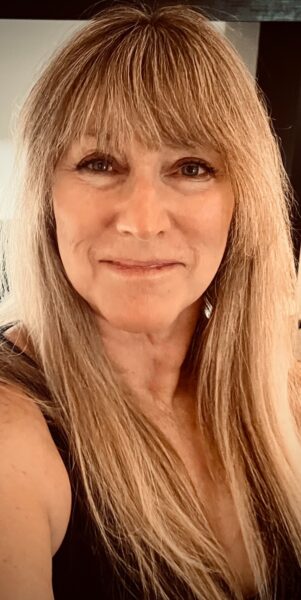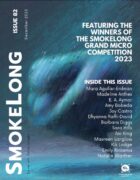I love that this is written in the hypothetical, as an “if-then” story. Why cast this pall of a doubt over the proceedings, making it conditional instead of concrete? And if you didn’t write “Passing” as an if-then story, then how would you have written it?
I knew from the beginning that I wanted to work with an “if-then” structure, since this narrator is angry. Anger is a socially unacceptable reaction to loss—it’s unattractive, right?—so she’s looking for validation, “If this happened to you, wouldn’t you feel this way?” It also provides her a safe place to hide, as the “hypothetical” aspect you’ve mentioned creates a “Hey, I’m asking for a friend” kind of facade. When coupled with the rhythmic short phrases, the “if-then” really fuels the pace. I mean, it’s rush-rush and then she crash-lands in an empty place; everything is gone.
I keep searching for a metaphor for the horn—i.e, penis, sex, etc.—and I guess it works if I force it. The story is about an older guy taking one last toot of a horn before he goes. Thematically, I think it outreaches anything sexual. Were you thinking anything along these lines?
Yeah, it’s hard to render the horn as a succinct sexual symbol in that way. There is an undercurrent of jealousy threading through the story; that probably emerges most clearly in the competition between the mother and daughter—they’re battling over ownership of the father, his stuff, his memory. The horn may amplify that, the Electra complex, certainly the narrator fingering the valves is a charged moment. But I was looking at the horn more broadly, as a vehicle that would carry the story forward through different moments in time. (The story opens with this Gabriel-like image of blowing the trumpet at final judgment/death.) I thought the horn would capture the breathiness of the narrative, the concept of self-expression, or soul-expression, sort of Rilke’s call-note of depth-dark sobbing, and it also represented masculine energy (the stag). For the narrator, the horn is something of a mystery, but it’s part of who her father is, his essential self, particularly his self-expression as artist/musician, something that at times was denied him, so I really saw it more as the father’s soul-symbol. He is a musician, and he is actually the muse of the story.
There’s something magical here, your speaker falling asleep with the Bambi toy then waking to the deer at the window, then connecting that with the father. Do you think the story exceeds straight-up realism?
I’m so glad you found that magical! I think moments of insight and/or connection are magical—but that’s my take on life in general. I was hoping to create an image-line that would call not only on the love a child often bears for a parent, but also on that kind of “mystical light” that obtains when we connect with each other, and with nature, music, or an essential truth. The “mystical” enters where our grasp on stuff departs, and I believe it enters our stories, and our lives, in just these kinds of inexplicable visionary ways. In my life magic like this is straight-up real!
I always tell students that one-word titles need to do a lot of work, have at least double-meaning, if not more. How do you think your title operates within the context of the story?
Yeah! As my buddy Glenn Orgias likes to say (Glenn Orgias, Smoke & Mirrors: https://www.smokelong.com/interviews/smoke-mirrors-with-glenn-orgias) one-word titles are cool cuz they’re contextless!—they can sound many notes. I hope this title suggests not just that “Dad passed away,” but also that time passes, place passes through time, it disintegrates, and what we’ve clung to disappears. To me the image of ashes passing through the narrator’s fingers is the powerful one. Her whole life is dust. This mother and daughter, they are moving past each other like shadows, drawing farther and farther away, it’s a negation. The “magical moment” you pointed out is a different kind of passing, the father and daughter encounter each other one last time, and for her that moment is an affirmation. He is “passing” what he was, his essential self, on to her. It’s just a deer passing through the yard. But in the story, it’s more than that.
Ultimately, this is about loss, the horn a vehicle for telling the story. Why is it easier for us to handle tragedy through these stories instead of straight-on “my dad died”-type approaches?
In my “day job” I work as a caregiver. Hospice situations are often dramatic and rife with unexpected responses to death. Sometimes these responses can be quite shocking. It’s not just about the loss, it’s about all the unresolved things in those relationships, and sometimes it’s about everyone else in the room, and it has nothing to do with the deceased person at all. When we share our loss-stories together, I think it’s more genuine than saying, “Yeah, I’m feeling down, my dad died.” The stories take on our difficult complexities. I hope as people read “Passing,” they feel heard, like it’s about them, or about something they’ve felt themselves. My hope was that there was something universal in it.



 The core workshop of SmokeLong Fitness is all in writing, so you can take part from anywhere at anytime. We are excited about creating a supportive, consistent and structured environment for flash writers to work on their craft in a community. We are thrilled and proud to say that our workshop participants have won, placed, or been listed in every major flash competition. Community works.
The core workshop of SmokeLong Fitness is all in writing, so you can take part from anywhere at anytime. We are excited about creating a supportive, consistent and structured environment for flash writers to work on their craft in a community. We are thrilled and proud to say that our workshop participants have won, placed, or been listed in every major flash competition. Community works.